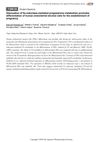 4 citations,
February 2019 in “Journal of Cutaneous Pathology”
4 citations,
February 2019 in “Journal of Cutaneous Pathology” The marker 5-hmC changes in hair follicle stem cells when they start to grow.
 1 citations,
February 2022 in “JAMA Dermatology”
1 citations,
February 2022 in “JAMA Dermatology” Minoxidil and finasteride are FDA-approved treatments for male hair loss, but off-label use of oral minoxidil, dutasteride, and higher doses of finasteride and minoxidil is increasing.
1 citations,
December 2021 in “Natural Product Research” β-sitosterol and brassicasterol may help treat hair loss.
 December 2024 in “Journal of Biophotonics”
December 2024 in “Journal of Biophotonics” Dual wavelength LEDs may help reduce hair loss by lowering DHT levels.

10% minoxidil improves frontal hair count more than 5% but has more side effects.
 April 2024 in “Expert opinion on emerging drugs”
April 2024 in “Expert opinion on emerging drugs” New treatments for male hair loss are being explored to improve effectiveness and reduce side effects.
 March 2024 in “Journal of the American Academy of Dermatology”
March 2024 in “Journal of the American Academy of Dermatology” Taking medication for hair loss might cause sexual problems.
 January 2024 in “Brazilian Journal of Hair Health”
January 2024 in “Brazilian Journal of Hair Health” Some plant-based products might treat hair loss with fewer side effects than current medications.

Finasteride harms Daphnia magna's reproduction and metabolism.

Fructus Psoraleae may help treat hair loss by inhibiting 5-α reductase and affecting the Nrf2-Keap1 pathway.
 January 2024 in “Advances in Dermatology and Allergology”
January 2024 in “Advances in Dermatology and Allergology” Platelet-rich plasma treatment significantly thickens hair shafts.
 September 2023 in “PubMed”
September 2023 in “PubMed” Platelet-rich plasma therapy works better than minoxidil for hair loss treatment in the tested group.
January 2023 in “Rasayan journal of chemistry/Rasayan journal of Chemistry” Methyl pyropheophorbide A from Sansevieria trifasciata leaves may help treat hair loss.
Dutasteride is more effective than finasteride for treating BPH without extra safety risks.
 February 2020 in “Definitions”
February 2020 in “Definitions” 5 Alpha-Reductase Inhibitors reduce the effects of testosterone by blocking its conversion into a stronger form.
January 2019 in “Urology Practice” Urologists prescribe newer medications more often than primary care physicians, who could benefit from more education on treatment options.
The document cannot be parsed, so there is no conclusion to summarize.
April 2017 in “The journal of sexual medicine” 5-alpha-reductase inhibitors significantly affect the penile tissue of hypertensive rats.
April 2017 in “The Journal of urology/The journal of urology” SHH protein helps nerve regeneration in hypertensive rats.
April 2011 in “Journal of Medicinal Plants Research” Ocimum basilicum L. and red Oryza sativa L. may help with hair loss and prostate issues.
February 1996 in “Clinical Pharmacology & Therapeutics” MK-386 reduces sebum DHT levels.
June 2019 in “Journal of Drug Delivery and Therapeutics” Finasteride effectively treats hair loss and prostate issues with minimal side effects.
Dutasteride and finasteride can change hair growth genes, helping treat hair loss.
14 citations,
August 2011 in “Journal of the American Academy of Dermatology” Imiquimod 5% cream may not work for treating scrotal extramammary Paget disease.
 2 citations,
January 2014 in “Hair therapy & transplantation”
2 citations,
January 2014 in “Hair therapy & transplantation” Using 5% Minoxidil solution with oral chelated zinc supplement can effectively treat female pattern hair loss.
1 citations,
January 2022 in “Journal of Cutaneous and Aesthetic Surgery” Combining 5% minoxidil with platelet-rich plasma is more effective for hair loss than minoxidil alone.
 May 2024 in “Current perspectives on medicinal and aromatic plants”
May 2024 in “Current perspectives on medicinal and aromatic plants” Plant-based treatments might help with hair loss and have fewer side effects than synthetic drugs.
January 2021 in “Journal of clinical & experimental dermatology research” The new 5% minoxidil formulation without propylene glycol effectively promotes hair growth with fewer side effects and better user satisfaction.
 January 2020 in “Nihon Yakuri Gakkai nenkai yoshishu”
January 2020 in “Nihon Yakuri Gakkai nenkai yoshishu” Reducing 5α-reductase activity helps endometrial cells differentiate, aiding pregnancy.
14 citations,
June 1995 in “The Journal of Clinical Endocrinology and Metabolism”















